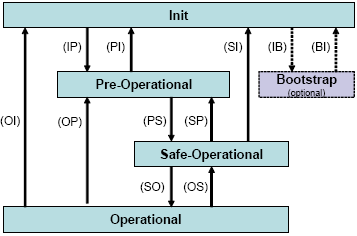Standards/Ethercat/StateMachine
(Created page with "{{TOC right}} == Introduction == The EtherCAT State Machine (ESM) is responsible for the coordination of master and slave applications at start up and during operation. State...") |
|||
| Line 19: | Line 19: | ||
'''Figure 1: EtherCAT State Machine''' | '''Figure 1: EtherCAT State Machine''' | ||
| + | NOTE: Not all state changes are possible, e.g., the transition from ‘Init’ to ‘Operational’ requires the following sequence: Init → Pre-Operational → Save-Operational → Operational. | ||
| + | |||
| + | Each state defines required services. Before a state change is confirmed by the slave all services required for the requested state have to be provided or stopped respectively. | ||
== Sources == | == Sources == | ||
Revision as of 13:38, 11 June 2012
|
Introduction
The EtherCAT State Machine (ESM) is responsible for the coordination of master and slave applications at start up and during operation. State changes are typically initiated by requests of the master. They are acknowledged by the local application after the associated operations have been executed. Unsolicited state changes of the local application are also possible.
Simple devices without a µController can be configured to use EtherCAT State Machine emulation. These devices simply accept and acknowledge any state change automatically.
There are four states an EtherCAT slave shall support, plus one optional state:
- Init
- Pre - Operational
- Safe - Operational
- Operational
- Bootstrap (optional)
The states and the allowed state changes are shown in figure 1:
Figure 1: EtherCAT State Machine
NOTE: Not all state changes are possible, e.g., the transition from ‘Init’ to ‘Operational’ requires the following sequence: Init → Pre-Operational → Save-Operational → Operational.
Each state defines required services. Before a state change is confirmed by the slave all services required for the requested state have to be provided or stopped respectively.
